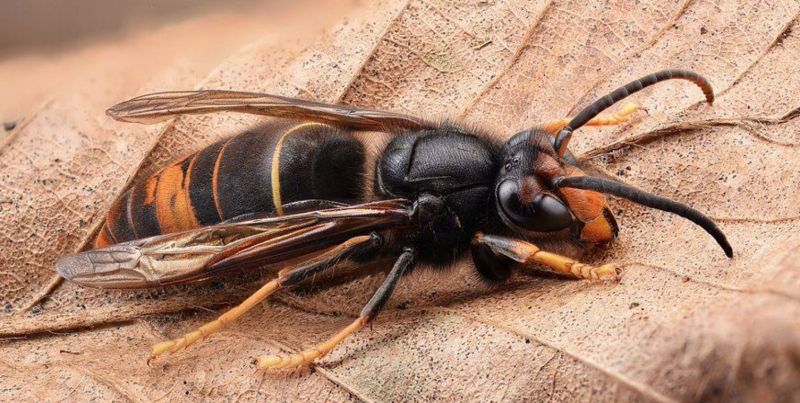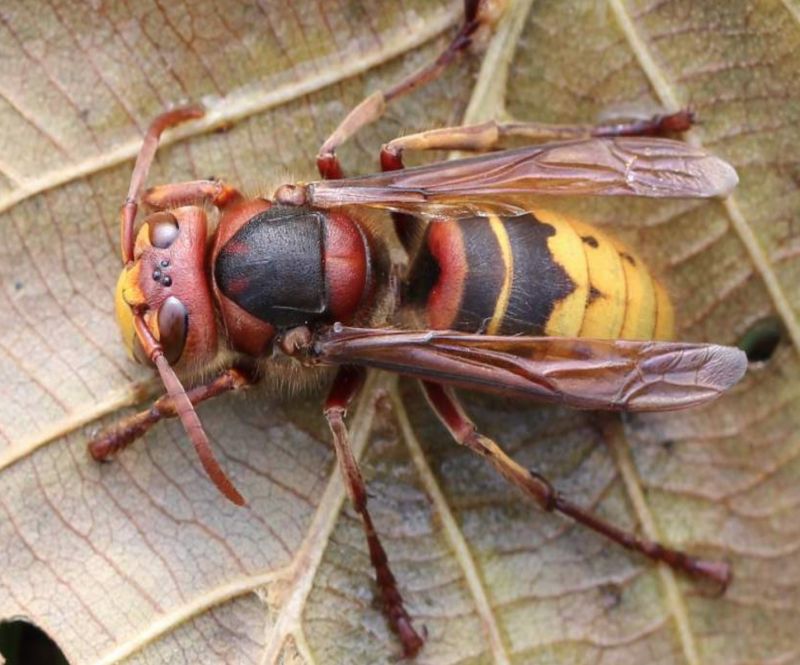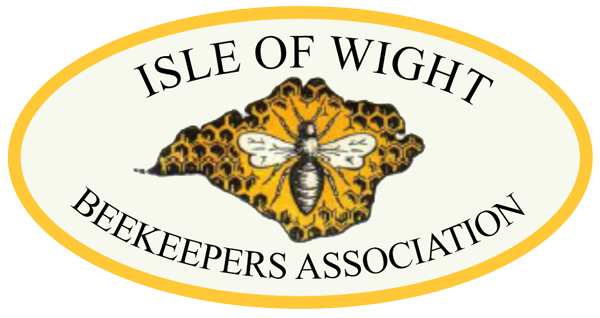The IWBKA would like to prepare our members and the public in general for the likely arrival of the Asian hornet (Vespa velutina) in the Isle of Wight.
It is believed that the Asian hornet was first introduced to France in 2004 in a shipment of goods from East Asia; since then, it has rapidly spread to neighbouring countries. In the UK, sightings have been confirmed in Hampshire and other parts of the country, where nests have been destroyed. No sightings have been reported yet in the Isle of Wight, but we believe that their arrival here is imminent.
We therefore have a valuable opportunity to stay ahead of the game by preparing for the Asian hornet’s arrival, an opportunity we must not waste.
Why is the Asian Hornet a Problem?
The Asian hornet is a highly effective non-native predator and our existing ecosystems have not had the time to adjust to this species.
The Asian hornet has a voracious appetite for some beneficial pollinators, particularly bees. British pollinators are already under stress due to a loss of habitat, increased use of pesticides and changes in the climate. The Asian hornet poses a significant new and additional threat to native British insect populations. Insects are a vital resource of food, and their loss affects many other species throughout the food chain. Currently many food chain links are unstable. If even one link is altered, the entire chain may collapse. This poses a great threat to the natural world and therefore to humans who rely on the health of the natural world to survive.
The European hornet (Vespa crabro) is native and therefore a stablished species, which helps to maintain the natural balance of other invertebrates, predating on other pollinators that are often regarded as garden and agricultural pests such as flies, beetles and wasps. European hornets don’t usually predate on bees. Asian hornets, on the other hand, are specialised bee predators.
Neither Asian or European hornet species is naturally aggressive, however they are both especially protective and defensive of their nests and when disturbed will attack.
Identifying Asian Hornets
Asian hornets are slightly smaller than our European hornets, however the Asian hornet carries more venom and will sting repeatedly if intimidated.
Asian hornets are identifiable by their distinctive velvety black thorax and brown legs with yellow stockings. Asian hornets also carry an orange band around their fourth segment.


ASIAN HORNET
EUROPEAN HORNET
This website further explains how to identify the Asian hornet. These differences, versus other polinators, can also visualised in the picture here.
What can you do?
R.I.S.E - Report. Import. Support. Eradicate
Report. If you see a suspected Asian hornet, you should try and report your sighting. This can be done quickly and easily on the “Asian Hornet Watch” app (available on apple and android) or by emailing this email alertnonnative@ceh.ac.uk. In addition, you should report it to your local beekeepers’ association (IWBKA for the Isle of Wight).
Support. Contact IWBKA to find out how you can support the various contingency plans.
Import. If you are travelling from France or anywhere else in Europe, you should thoroughly check your boat, caravan and/or car for Asian hornet stowaways to prevent importation.
Eradicate. Eradication of pioneer Asian hornet nests is essential to preventing its spread. Identification of nests sites is done by trapping a drone and tracking it back to its nest. This should be carried out by the Asian hornet specialised team in the IWBKA.
The IWBKA are sending a team of volunteers to Jersey this year, to gain experience on dealing with the Asian hornet. They will learn about Asian hornet identification and how to track and monitor their populations. Asian hornets were first seen in Jersey in 2016 and, since then, numbers have rapidly increased - 174 nests were located and destroyed in 2022.
However, we need your help to increase the awareness about the Asian hornet and the harm they can cause as well as to be vigilant and report any suspected sighting. The time to act is now.
The IWBKA team who will be trained to deal with the Asian hornet are:
- Christine McClellan
- Chloe Underwood
- Terri Burts
- Ruth Green
If you want learn more about the Asian hornet, please check out sites such as the following:
· BBKA (British Beekeepers’ Association)
· NNSS (GB Non-native Species Secretariat)
